Our mission
We strive to help residents protect themselves and their families from mosquito borne illness. We do this by following a comprehensive strategy that takes advantage of multiple mosquito control methods that reduce the public’s exposure to disease while maintaining a quality environment.
Surveillance
Our program sets approximately 70 traps per week in the Precinct 3 region of Montgomery County, Texas.
Starting in 2019, Precinct 3 has begun trapping the whole of Montgomery County in efforts to track disease activity in mosquitoes.
We use three main trap designs to catch different mosquito species. During the summer months, we use a gravid trap to catch the two main mosquito species that we track for disease activity, Culex quinquefasciatus (West Nile Virus) and Aedes albopictus (Zika Virus). Since our program is year round, during the off-season we employ light traps and BG Sentinel traps in efforts to track the activity of different mosquito species.
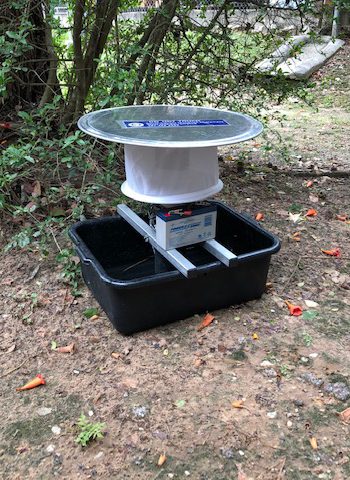
Disease Testing
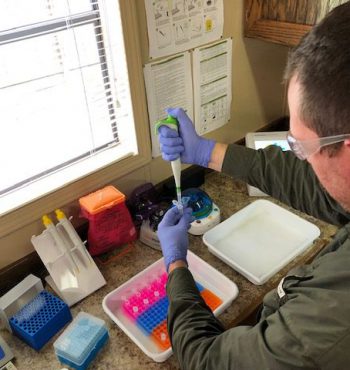
During the summer months we are responsible for testing both Culex quinquefasciatus mosquitoes for West Nile Virus, and Aedes albopictus mosquitoes for Zika Virus. Due to COVID this year we are allowed to send up to a set limit of our samples to the Texas Department of Health Services in Austin, Texas. The other samples we perform in house with the use of West Nile RAMP test kits.
Treatment
In the event that mosquitoes test positive for West Nile virus we will then treat the affected areas via truck using a ULV (Ultra Low Volume) fogger. After completion of the pesticide treatment, testing of the area will resume to determine if disease activity is still present.
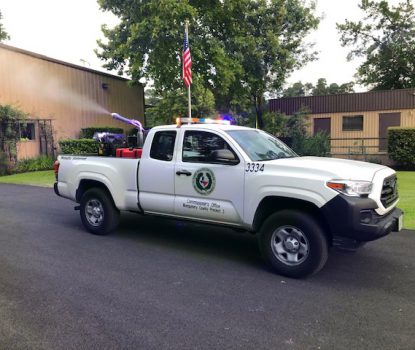
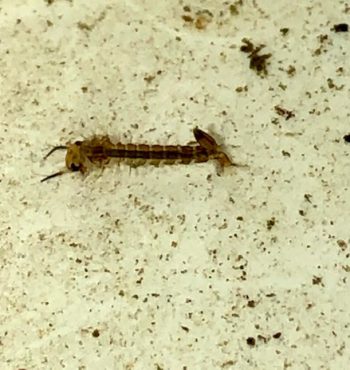
To prevent the abundance of nuisance mosquitoes and the potential for disease carrying mosquitoes, we attempt to control them in their larval stage. With the help of the county residents we search for areas of standing water that mosquitoes need to survive. If the water cannot be drained we will then treat the water with a larvacide that will kill the larvae.
West Nile Virus Activity and Treatment Map
Recent News:
Montgomery County Precinct 3 Commissioner James Noack’s mosquito abatement team has seen an increase in West Nile virus activity in the region compared to this same time last year.
• 50 positive mosquito samples in Montgomery County to date.
• 33 operational zones have tested positive this year.
• 45 spray missions have been completed, treating up to four zones per mission to date.
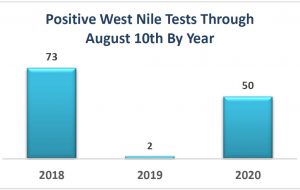
Reminder, the mosquitoes that transmit the West Nile virus are most active from dusk until dawn. The use of mosquito repellent is encouraged when you go outdoors.
Please refer to the Treatment Activity Map on Precinct3.org to see when treatment will take place in your area.
Montgomery County Precinct 3 will continue monitoring for West Nile and treat for mosquitoes in areas where disease activity is present.
For more information call the Precinct 3 Mosquito Abatement Department at 281-364-4203 or visit http://wordpress-379412-1431109.cloudwaysapps.com/mosquito-abatement/
A mosquito sample has tested positive for the West Nile virus in Montgomery County Precinct 2 in the Alden Bridge village of The Woodlands.
Treatment of the affected areas will be completed by Precinct 3 and is scheduled to begin on the evening of Friday, July 10, at 8:30 p.m. A second round of treatment is scheduled for the evening of Monday, July 13. Treatment will include spraying all streets and county rights of way within the affected areas.
Residents can check the treatment activity map to learn when spraying will occur in their neighborhoods.
Residents are advised to avoid outdoor activity during the scheduled treatment hours. Personal protective measures, such as insect repellent, wearing long, light loose clothing, eliminating standing water, also should be taken.
For residents who would like assistance identifying mosquito breeding sites in their drainage ditches or in the county right of way near their home, call 281-364-4203 to set up an appointment. Our teams can provide customized advice on how to deal with these issues.
Remember to Think WET!
Wear repellent
Eliminate standing water
Treat water you can’t eliminate
Two additional mosquito samples have tested positive for the West Nile virus in the area of the Grogan’s Mill village in The Woodlands.
Treatment of the affected areas is scheduled to begin on the evening of Friday, June 26, at 8:30 p.m. A second round of treatment is scheduled for the evening of Monday, June 29. Treatment will include spraying all streets and county rights of way within the affected areas.
Residents can check the treatment activity map to learn when spraying will occur in their neighborhoods.
Residents are advised to avoid outdoor activity during the scheduled treatment hours. Personal protective measures, such as insect repellent, wearing long, light loose clothing, eliminating standing water, also should be taken.
For residents who would like assistance identifying mosquito breeding sites in their drainage ditches or in the county right of way near their home, call 281-364-4203 to set up an appointment. Our teams can provide customized advice on how to deal with these issues.
Remember to Think WET!
Wear repellent
Eliminate standing water
Treat water you can’t eliminate
First mosquito sample of 2020 season tests positive for West Nile Virus
Precinct 3 Commissioner James Noack’s mosquito abatement team disclosed the first West Nile virus positive mosquito sample of the 2020 season was identified earlier today. The mosquito was trapped in one of the department’s operational zones in the Panther Creek area in The Woodlands.
Treatment of the affected area is scheduled to begin at 8:30 p.m. Saturday, June 6. A second round of treatment is scheduled for the evening of Monday, June 8. Treatment will include spraying all streets and county rights of way within the affected area.
“Our office is working diligently to minimize the risk of residents contracting a mosquito-borne illness,” Precinct 3 Commissioner James Noack said.
Residents can check the treatment activity map to learn when spraying will occur in their neighborhoods.
Residents are advised to avoid outdoor activity during the scheduled treatment hours. Personal protective measures, such as insect repellent, wearing long, light, loose clothing and eliminating standing water, also should be taken.
“The one thing that all mosquitoes require for reproduction is a source of water. Be sure to turn over or remove anything from your yard that can hold water,” Montgomery County Mosquito Abatement Director Justin Fausek said. “If you have areas where you can’t get rid of water, such as a birdbath or meter box, you can treat it with a larvicide containing BTI instead.”
For residents who would like assistance identifying mosquito-breeding sites in their drainage ditches or in the county right of way near their home, call 281-364-4203 to set up an appointment. Our teams can provide customized advice on how to deal with these issues.
Please direct questions via email to justin.fausek@mctx.org or call the mosquito phone line at 281-364-4203.
Culex Quinqufasciatus
Habitat: Prefers residential areas, breeds in more dirty water.
Disease: West Nile Virus
Active Time: Typically more towards the evening.
Aedes Albopictus
Habitat: Prefers residential areas, breeds in more clear water.
Disease: Zika Virus
Active Time: All times of the day.
Psorophora Ferox
“Ferox with white socks”
Habitat: Prefers woodland areas, floodplain mosquitoes come out after a heavy rain.
Disease: None, but known for their aggressive biting.
Active Time: All times of the day.
Toxorhynchites
“Elephant Mosquito”
Habitat: Woodland areas along with residential.
Disease: None, these mosquitoes do not take a blood meal, they drink nectar and their larvae eat other mosquito larvae.
Active Time: More common during the day.

![West Nile 08-2020 IV[650] West Nile 08-2020 IV[650]](https://wordpress-379412-1431109.cloudwaysapps.com/wp-content/uploads/2020/09/West-Nile-08-2020-IV650-500x1000.png)
